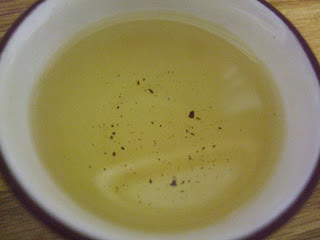So much for updating more often, Christmas was a long process consisting of relatives visiting and small cousins (children and teapots do not mix well). Alas, my tea drinking has gone through a bit of a dry spell. On top of that, I have some disheartening news. Apparently yixing teapots dedicated to Dan Cong should be as thin as possible, contradicting the thick and heavy theory I had embraced beforehand. Thus, my heavy and stout hei ni teapot dedicated to Dan Cong has been wasted. Luckily though, heavily roasted Dan Cong are an exception so it's not a complete waste.

So this week I decided to sample some Bai Ji Guan, a type of Wuyi tea. The name literally translate to White Cockscomb, and it has a very interesting history to the name. But first, what is cockscomb? Well, it's the little red thingy on top of the rooster's head. According to legend, the name was given by a monk in honor of a rooster who died defending his baby from an eagle. The monk was so touched that he buried the rooster there, and from that spot a tea bush grew. It's also a Si Da Ming Cong, or one of the four famous wuyi tea types.

This particular tea lived up to the expectations that I had, from what I knew/read about Bai Ji Guan before. The dry leaf has a semisweet chocolate aroma, with a little fruitiness. It's not too clear from the photo, but the leaves are yellowish, typical of Bai Ji Guan. There is a faint honey-like taste to the tea, with a slight toasted flavor, very reminiscent of the burnt rice you find at the bottom of Bibimbap. As the steepings continue I notice a lingering mellow fruitiness.There is a nice copper color to the tea, which I like very much. Overall, it's a very mild tea, with a nice finish.
I think compared to the other Wuyi I've tasted this one stands out the most for its sweet, toasted taste. I'm a little bummed at how expensive Bai Ji Guan is, which is also attributed to the fact that this tea isn't as big as the other Wuyi types. At Seven Cups the 2007 harvest goes for $38 for 25 grams. I don't know when I'll get the chance to sample that. Luckily the version at TeaCuppa was a much nicer bargain, and although people say that the TeaCuppa version is not that great, the price speaks for itself.
 So this week I decided to sample some Bai Ji Guan, a type of Wuyi tea. The name literally translate to White Cockscomb, and it has a very interesting history to the name. But first, what is cockscomb? Well, it's the little red thingy on top of the rooster's head. According to legend, the name was given by a monk in honor of a rooster who died defending his baby from an eagle. The monk was so touched that he buried the rooster there, and from that spot a tea bush grew. It's also a Si Da Ming Cong, or one of the four famous wuyi tea types.
So this week I decided to sample some Bai Ji Guan, a type of Wuyi tea. The name literally translate to White Cockscomb, and it has a very interesting history to the name. But first, what is cockscomb? Well, it's the little red thingy on top of the rooster's head. According to legend, the name was given by a monk in honor of a rooster who died defending his baby from an eagle. The monk was so touched that he buried the rooster there, and from that spot a tea bush grew. It's also a Si Da Ming Cong, or one of the four famous wuyi tea types.








